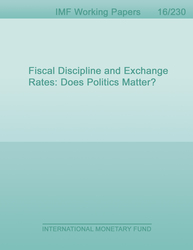
Fiscal Discipline and Exchange Rates : Does Politics Matter?
We look at the effect of exchange rate regimes on fiscal discipline, taking into account the effect
of underlying political conditions. We present a model where strong politics (defined as
policymakers facing longer political horizon and higher cohesion) are associated with better fiscal
performance, but fixed exchange rates may revert this result and lead to less fiscal discipline. We
confirm these hypotheses through regression analysis performed on a panel sample covering 79
countries from 1975 to 2012. Our empirical results also show that the positive effect of strong
politics on fiscal discipline is not enough to counter the negative impact of being at/moving to
fixed exchange rates. Finally, we use the synthetic control method to illustrate how the transition
from flexible to fully fixed exchange rate under the Euro impacted negatively fiscal discipline in
European countries. Our results are robust to a number of important sensitivity checks, including
different estimators, alternative proxies for fiscal discipline, and sub-sample analysis.
Publication date: November 2016
ISBN: 9781475555769
$18.00
Add to Cart by clicking price of the language and format you'd like to purchase
Available Languages and Formats
| English |
Prices in red indicate formats that are not yet available but are forthcoming.
Topics covered in this book
This title contains information about the following subjects.
Click on a subject if you would like to see other titles with the same subjects.
Economics- Macroeconomics , Economics / General , International - Economics , Fiscal discipline , Deficit , Political Economy , Exchange Rates
Summary
Copyright © 2010 - 2026
Powered by:
AIDC



